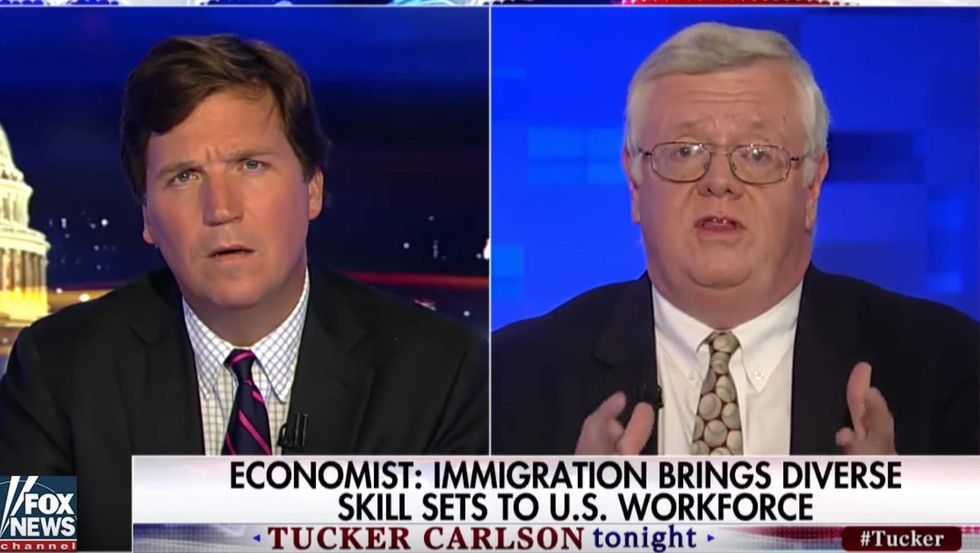
Tucker Carlson had a combative debate with economist Ray Keating over the benefits of illegal immigration. Image Source: YouTube.

Tucker Carlson had a combative debate with Ray Keating, the chief economist of the Small Business and Entrepreneurship Council, who argues that immigration is a net plus for an economy. The segment aired Thursday on Fox News.
"The underlying assumption is that all immigrants are the same," Carlson argued. "They're fungible, when in fact, they're not. The value of a software engineer is different from that of a laborer. Henry Ford is different from members of MS-13. It depends on the kind of immigrants you get and I don't think you factor that in to your calculation."
"I think you're absolutely right in terms of the contribution you make," Keating said. "I mean we all make different contributions to the economy. So immigration is great in terms of bringing entrepreneurs in. Immigrants tend to be very entrepreneurial, more entrepreneurial than the native born. Uhm, young workers, young immigrants will help us in terms of people getting older, Baby Boomers retiring."
"And then there are people at varying skill levels," he argued, "that help out and are largely complimentary to the existing labor force and that helps out everybody and winds up increasing productivity, so I think. Listen any economist worth his salt is going to say there are obviously costs. The point with the letter that we signed, 1,470 economists said that immigration is a net economic plus from the country. And that's one of the few issues economists actually agree on."
"I don't think that's an economic statement," Carlson disagreed, "that's a political statement, and I think it's a meaningless statement. 'A net economic benefit' doesn't mean anything, because there are a lot of people who lose and they are voters and citizens, and they are being hurt, but a policy that helps another, and I would argue, a smaller number of people, so it's meaningless actually."
"No, actually it's not, and it's sound economics 101," Keating offered. "And if you look at the economy, I don't want you to fall into that zero sum idea. It's not as if the economy is a pie and we only have so many jobs to go around. What we need is economic growth and that's what happens in the economy. So this whole immigration debate is very frustrating from an economist's standpoint."
"What we would rather see," he added, "I mean what I would rather see is a growth agenda so that we're growing so much, so robustly that we need workers from all around the world to come here. That's what we should be focused on if we're really concerned about the economy."
"So, but it's actually not an economist's perspective," Carlson disagreed, "and I appreciate the kinda subtle patronizing, 'as an economist,' but you're wrong, as you know. So you can see economies across the world, yeah of course, as you know, China has no net immigration and I've been in Singapore and neither has been held back by it. California has massive bet immigration and it's much poorer than it was 30 years ago. So explain that."
"Our edge, one of the key edges that we have is our entrepreneurial DNA if you will," Keating offered. "And the people that come here, tend to be risk-takers right, you left your country, you came here, that's a risky endeavor, and that's why we see a higher rate of entrepreneurship among immigrants."
"This is what I love!" laughed Carlson, "Didn't you just say 'as an economist,' and now you're talking about the 'DNA of entrepreneurship.' You're moving into theology fairly rapidly.
"Am I not allowed to use some nice language?" Keating said, "I don't have to be a boring economist, I can be a good economist, I don't want to be boring about it."
"We always welcome theologians on the show, just not when they pose as economists," Carlson chided his guest. "So there's no way to quantifiably measure entrepreneurship..."
"Oh there are a whole host of studies," Keating interrupted, "the National Academy of Sciences just did a study, Richard Vetter is a wonderful conservative economist, he did a study a few years ago for the George W. Bush institute. I'd recommend you read that, and then pick up an economics 101 textbook as well!"
"I concede part of what you're saying," Carlson said, "which is there are a lot of energetic, smart immigrants and I love them personally, my business partner is one of them. But I think there are also a lot of immigrants who are clearly a net drain on the economy, consume more in goods and services than they pay back. There's no disputing that, and you know it."
"So here's the question," Carlson continued. "Why not make an affirmative effort to import people with existing skills or wealth, and then we'd be much richer, why not make distinctions among immigrants?"
"We could agree on, how about start-up visas, right?" Keating said. "Why don't we have start-up visas like other countries do, I think that's a great idea to get entrepreneurial immigrants into the country. So we can agree on that."
"No," Carlson replied.
Carlson continue to argue that Keating was offering the same rationalizations he had heard for 30 years, but that immigration had caused the culture to collapse.
Illegal immigration has been falling precipitously since President Trump's inauguration, causing many to credit his tough talk on deportation and the many promises he made during his presidential campaign.
